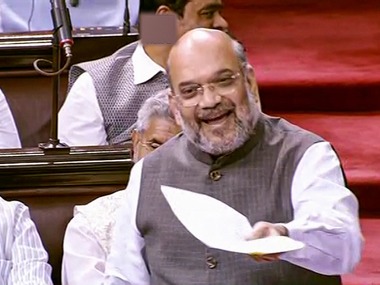Seeking to allay fears over the National Population Register (NPR), Home Minister
Amit Shah
on Thursday said no citizen will be marked ‘D’ or ‘doubtful’ during the updating exercise and no documents need to be furnished to prove citizenship. Also, it is not compulsory to provide any information not available with an individual, he said. Shah gave the clarification during his reply to a debate on communal riots in Delhi which he said were triggered by alleged hate speeches made after passing of the new citizenship law that gave non-Muslim illegal migrants from neighbouring nations Indian citizenship. [caption id=“attachment_8146161” align=“alignleft” width=“380”]
 Amit Shah speaks in Rajya Sabha during the ongoing Budget Session of Parliament. PTI[/caption] The updating of the NPR is to be done during six months beginning 1 April with enumerators seeking demographic and other particulars of each family and individuals. However, it is important to note that Shah made the statement on marking people’s citizenship status as ‘doubtful’ in the context of the NPR, and not the National Register of Citizens. As pointed out in an
article in Scroll
, the NPR is merely a list of all residents of the country and the component of identifying people with ‘doubtful citizenship’ is expected to be a part of the NRC (if it is implemented nationwide.) The
Citizenship Rules, 2003
, which are presently in force, also provide for marking people as ‘doubtful’ citizens. Section 4 of the Rules deal with the preparation of the National Register of Indian Citizens. In this provision, sub-rule 4 states, “During the verification process, particulars of such individuals, whose Citizenship is doubtful, shall be entered by the Local Registrar with appropriate remark in the Population Register for further enquiry and in case of doubtful Citizenship, the individual or the family shall be informed in a specified proforma immediately after the verification process is over.” Further, sub-rule 5 (a) states, “Every person or family specified in sub-rule (4), shall be given an opportunity of being heard by the Sub-district or Taluk Registrar of Citizen Registration, before a final decision is taken to include or to exclude their particulars in the National Register of Indian Citizens.” In December 2019, Prime Minister
Narendra Modi
had said at a rally in Delhi that there have been no discussions on a nationwide NRC. However, in the previous month, Shah had said the NRC process will be carried out
across the country
, and said that there would be no discrimination on the basis of religion. The D-voter category was first introduced in Assam in 1997 to identify people with doubtful citizenship status. People in this category are mentioned in the electoral rolls, but have a ‘D’ marked against their name, which means they can’t vote. With inputs from PTI
Amit Shah speaks in Rajya Sabha during the ongoing Budget Session of Parliament. PTI[/caption] The updating of the NPR is to be done during six months beginning 1 April with enumerators seeking demographic and other particulars of each family and individuals. However, it is important to note that Shah made the statement on marking people’s citizenship status as ‘doubtful’ in the context of the NPR, and not the National Register of Citizens. As pointed out in an
article in Scroll
, the NPR is merely a list of all residents of the country and the component of identifying people with ‘doubtful citizenship’ is expected to be a part of the NRC (if it is implemented nationwide.) The
Citizenship Rules, 2003
, which are presently in force, also provide for marking people as ‘doubtful’ citizens. Section 4 of the Rules deal with the preparation of the National Register of Indian Citizens. In this provision, sub-rule 4 states, “During the verification process, particulars of such individuals, whose Citizenship is doubtful, shall be entered by the Local Registrar with appropriate remark in the Population Register for further enquiry and in case of doubtful Citizenship, the individual or the family shall be informed in a specified proforma immediately after the verification process is over.” Further, sub-rule 5 (a) states, “Every person or family specified in sub-rule (4), shall be given an opportunity of being heard by the Sub-district or Taluk Registrar of Citizen Registration, before a final decision is taken to include or to exclude their particulars in the National Register of Indian Citizens.” In December 2019, Prime Minister
Narendra Modi
had said at a rally in Delhi that there have been no discussions on a nationwide NRC. However, in the previous month, Shah had said the NRC process will be carried out
across the country
, and said that there would be no discrimination on the basis of religion. The D-voter category was first introduced in Assam in 1997 to identify people with doubtful citizenship status. People in this category are mentioned in the electoral rolls, but have a ‘D’ marked against their name, which means they can’t vote. With inputs from PTI
Amit Shah in Rajya Sabha says no one to be marked 'doubtful' citizen, no documents needed during NPR exercise
FP Staff
• March 12, 2020, 21:56:58 IST
Seeking to allay fears over the National Population Register (NPR), Home Minister Amit Shah on Thursday said no citizen will be marked ‘D’ or ‘doubtful’
Advertisement
)
End of Article